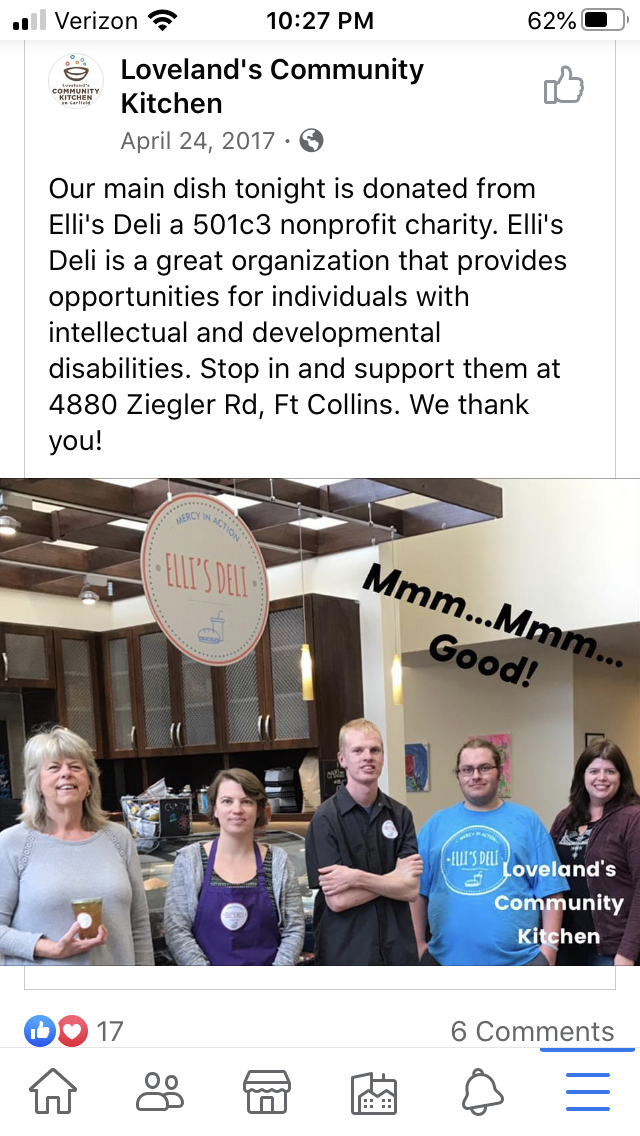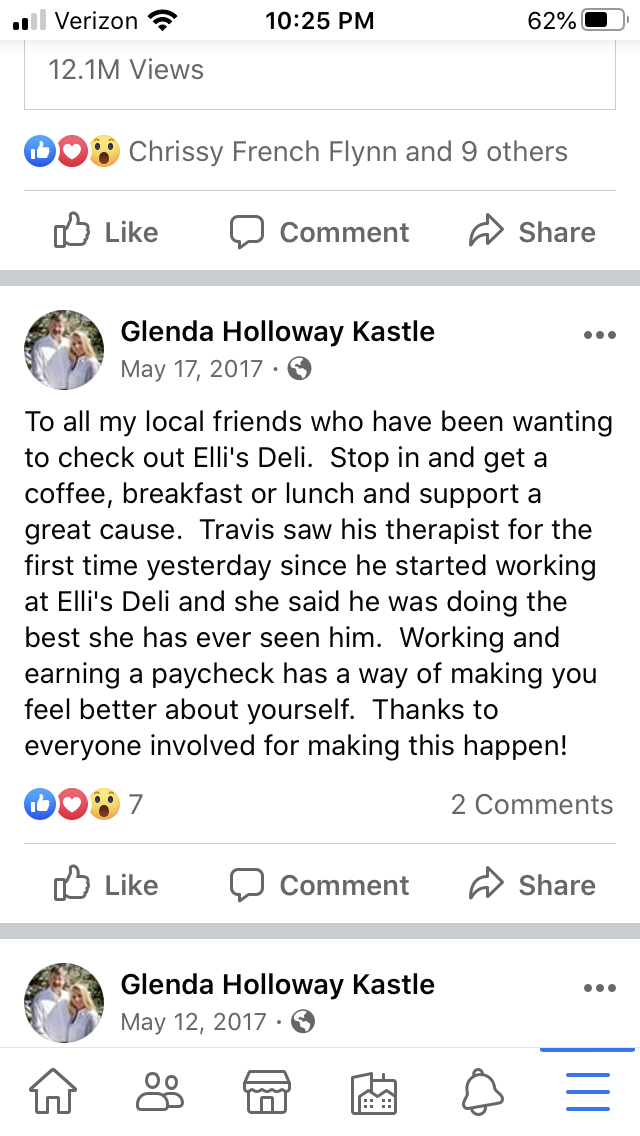“She Lets Me be Me”
One of our concerns from very early on was whether Travis would be able to live independently. A big piece of living on your own is being employed.
If you have been following our story from the beginning, you already know that we began to address his employability when he was in middle school. Starting at this point should give us plenty of time to help meet his needs. We had been counseled that he would need to find a position that was of great interest to him. Because of his focus issues.
He participated for a very short time in an internship with a local veterinarian. I felt that this may be a good fit because of his love for animals. As it turns out, we were going to need to address more than focus issues. Travis’s brain works differently. He has a lot of ideas of how things could work better. His idea of better makes sense to him. The veterinarian set up her business to work in a way that worked best for her. It was a fast paced business and she and her staff simply did not have the time to redirect Travis or explain to him why things were set up the way they were.
Travis also has a habit of saying everything he is thinking out loud. He does not have a filter. So when he is saying what he is thinking he is also likely to use cuss words. Regularly. I have worked in the customer service industry for the bulk of my career. I cannot even imagine how my businesses would have survived if I said what I was thinking. Sometimes I would come home and tell Tracy that owning my own business wouldn’t be so bad if I didn’t have to deal with customers and employees. (Most of my customers and employees were awesome! But there were days!)
To be employed you also need to get along with coworkers. Travis has certain areas of interests that may be of no interest to others. That doesn’t mean he is not going to tell you all about it. And if you knew anything, you would be interested too.
Travis has difficulty following directions. Maybe he should clean the area he was told to clean up after the animals. But playing with and holding the animals was way more fulfilling for him. He is obstinate. It is very difficult to get him to do anything that he doesn’t want to do. This may also be due to his mental health issues.
On top of that each day is different. Some days he is more capable than others. This is very difficult to manage as parents. Parents dig deep in order to meet the needs of our children. That is because we love them. Employers on the other hand, they do not have the time and energy to manage these types of needs.
Travis has great difficulty with his processing speed and with his short term working memory. Even if it was a day where he felt like following your directions, he cannot even remember them. Or understand them.
These are all a pieces of his intellectual/developmental disability and mental illness.
He participated in many internships through school. The Denver Zoo. The Ferret Rescue. Classrooms, helping with fellow students that had higher needs. We continued to see the same struggles. Lack of focus, easily distracted, difficulty following directions, offering his opinion and perspective to supervisors and customers.
Travis attended 18-21 transition services outlined in his IEP through school. This setting worked diligently on proper hygiene and employability. Travis did not appreciate this experience. After a few times of building pizza boxes for an hour straight he let everyone know that he was done. I heard him and could appreciate his position. He had learned how to build a pizza box. He was not interested in building pizza boxes as a career. Let’s move on.
The school district had contracted with various businesses and local parks. The district was getting paid for the services the kids provided through the transition services program. The idea was to work with the young adults with disabilities to teach them job skills. Well not exactly. Let me explain that better. Not all kids with disabilities receive job training in an 18-21 transition program. This program is not openly advertised in some school districts. A parent needs to know to ask for these services.
Travis knew the district was getting paid for the work that he and his classmates completed. He did not understand why he was working for free. He absolutely hated picking up the trash others left in the parks. From his perspective, he was working hard. Maybe he did on some days. The staff reported that Travis needed one on one support to complete any work.
After the 18-21 transition program we moved Travis into his own home with support. He applied for services through the Division of Vocational Rehabilitation (DVR). They approved his application and he was placed on their waiting list.
Once his name got to the top of a list, he chose a provider agency and began to work with a job coach. Their first goal was to find employment for Travis. For some reason I believed that DVR already had relationships in place with various local businesses and that these businesses would be open to training individuals with intellectual/developmental disabilities (IDD) to fill positions. That was not the case.
I shared with the job coach that Travis loves Halloween and that I saw a sign advertising help wanted at Spirit Halloween. I described in a previous blog that DVR initially said no to this opportunity for Travis until I intervened. It was a temporary position, but would allow Travis to get some job experience. The manager had a huge heart and made more accommodations for Travis than maybe he should have. Halloween stores are crazy busy and I am sure it was partly because he did not have the time to manage Travis his entire shift.
I also shared in a past blog how Travis fell into a dish washing position at a restaurant. Another very short-lived position.
A couple of weeks later, Travis’s job coach brought him for an assessment at a cracker production facility. Basically an assessment means that they will give him a “try out” for this position to assess whether it may be a good fit for him. The job coach shared with me and DVR that while there the owner was explaining some new procedures and Travis interrupted her many times. He said that he went to culinary school and worked in restaurants, so he knew what she was talking about.
Travis had spent three weeks in Denver at a program called the College Living Experience in which they did a class at the Emily Griffith Technical School on cooking. So as he would say, “technically” I attended culinary school. The restaurant job lasted a couple of weeks. He worked a day or two per week.
The job coach supported other IDD individuals at the cracker facility. One of these individuals said they knew Travis through a mutual friend. Apparently Travis no longer considered the third person to be a friend and began to share with the entire group exactly why. His job coach tried to redirect him and said not to gossip at work. Travis said, “It’s not gossip if it is true”. He decided the cracker company gave him a bad vibe and told the owner that he did not like their crackers and wouldn’t buy them. After only 45 minutes it was determined to not be a good fit.
At this point DVR referred Travis to meet with a psychologist that they contract with to get an evaluation to identify supports and rehabilitation needs for successful community employment. All job development was put on hold pending the results of the evaluation.
The evaluation report states the reason for referral, “Travis is referred for an Adaptive and Personality assessment, to update his current mental status, and to assist with recommendations for emotional restoration and alternative employment solutions, for the purpose of helping Travis become successfully employed”.
Per the evaluation, “Travis is diagnosed with autism spectrum disorder, and has multiple sensory integration issues, social-communication issues and a need for routine. Consequently, he can be rigid in his need to have things done in certain ways, can be overly sensitive and easily overstimulated, and will have difficulty with change. Travis will perform best at a job in which he has a strong interest, and where there is some variety on the job. He will likely become bored, restless, and act out, if the work is repetitive or boring. He enjoys interacting with people, and needs a work setting where his supervisor understands his special needs.
Travis needs a slower paced work environment, with a loose dress code. He can become upset when overly stimulated, which will likely increase his anxiety and anger. If he is having a bad day, his frustration tolerance decreases and he would benefit from a break or a day off. Additionally, he is very sensitive to negative feedback, and needs to work with a job coach who understands how to “sandwich” positive feedback, so that he can better tolerate guidance.
It is important that he be treated as an individual who is intelligent in many areas of his life, yet struggles with a learning disability. Travis will need to be given directions one at a time, as he will struggle to remember multiple instructions. Once a task is completed, he can be instructed on the next task. He will learn best through demonstration/modeling, in a hands on fashion.
Travis would likely work well in a structured work environment that also provides some diversity of job tasks. When Travis is able to use his coping mechanisms, such as listening to music with his headphones, he tends to stay calmer at work.
Finally, it is important to note that Travis tolerated this evaluation process for more than three hours, and was engaged and interactive during the assessment. It was clear that Travis has a good relationship with his mother and he noted, “She lets me be me, she gets me”. That seems to be the most important component for his success. Travis demonstrated a good sense of humor, and it was clear that when he feels respected and understood, he is more able to engage in an appropriate manner with others.”
The reason that Travis tolerated such a long evaluation is because I was at his side. And the psychologist let him speak candidly. She did not flinch when Travis used the F-word. Time and time again. She was awesome. But the information was everything we already knew. And shared with DVR. Maybe it is more believable if it comes from the psychologist that DVR chose?
Finding the type of job that the psychologist suggested is not easy. But I came upon an interesting find on my Facebook feed. Years before I had worked as a Business Manager at a provider agency that served individuals with IDD. I have several Facebook friends that still work there. One shared a post about a business opening called, Elli’s Deli.
Elli’s Deli started out as a non-profit food truck designed to provide individuals with disabilities with an opportunity for a positive, fun and rewarding work experience participating in Northern Colorado community events. The idea was that workers could develop skills and earn comparable wages to other community employment opportunities. The food truck sold gourmet sandwiches and food items using locally sourced and high quality products.
Per the Coloradoan, “As the operation gears up for its second season on the road, Elli’s Deli has also opened a brick-and-mortar coffee shop inside a new Fort Collins rehabilitation and assisted living center. The store is open to the public and serves a Guatemalan coffee in addition to breakfast burritos, pizzas, sandwiches and baked goods.”
The goal was to have a high turnover of employees! Meaning that they would train IDD individuals so that they had the skillset to move on to other community jobs. The owner stated that they would do whatever it takes to train people. Elli’s Deli used a cash register system that had pictures of the available items on the screen to make it easier for the employees to operate. Coffee came in only one size.
I did a bit of research and found that they were hiring employees working with DVR. Which surprised me because DVR did not tell us about this opportunity. I was excited. This business was managed by a provider agency. Meaning that they would understand and have experience working with IDD individuals. And they were going to do whatever it takes to train. The answer to our prayers.
Or so I thought. Travis did get hired. He seemed happy there. So imagine my surprise when after about a month of working a couple of short shifts per week there he received a Correction Action Plan. He was informed that he was on a two week probation. The letter was to serve as his final warning to address the issues listed below:
Respect management/supervisor
Taking responsibility for timely breaks
No raising voice, pouting, or otherwise displaying inappropriate behaviors at the coffee shop
No distracting others (employees, assisted living center employees, and customers/residents)
Wasting drinks by making them for other employees or yourself
Unnecessary feedback and not following directives, especially as it relates to working with other employees
Respect policies, especially in regards to phone calls while on shift
The plan stated that if he violated any of the above during the two week probation it would result in immediate termination. This created quite a bit of anxiety for him. And me as well. It just did not make sense. I understand the above issues, and it does sound like behaviors that Travis would engage in. The part that puzzled me was how quick they were to talk termination. It did not reconcile with the statement from the owner that they would do whatever it took to train people. They seemed to be giving up on Travis. Which causes him to give up on himself.
If that level of experience one on one with Travis doesn’t work, what will?
As it turned out, the coffee shop did not make a go of it. I believe location was a factor. It was located inside a facility a bit off the beaten path. So, “technically” Travis did not get fired.
A few months ago I wrote a blog titled, “Is it Worth it?” Today I revisited where we started with the employment vision. Coming up, I will write about the next couple of positions Travis attempted. And then we can talk about the effect this entire exercise has had on his mental health. And his quality of life.
“There comes a moment when you realize that what you’re advocating for is more than just accommodations. You’re really advocating for someone’s quality of life. That’s the moment you realize that you won’t give up.” - Author Unknown
Wish the feeling and this experience could’ve lasted longer for him. Plus, I did my part to promote the business. Even brought friends with me to buy coffee there!




